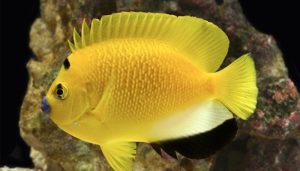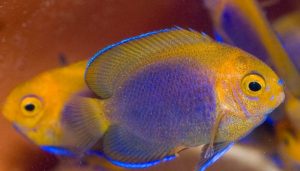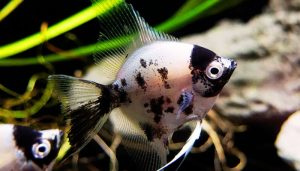Guppies are some of the most popular freshwater fish, known for their stunning colors, playful nature, and easy care. But when it comes to guppies feeding, many aquarium enthusiasts wonder, What do guppies eat?
Whether you’re a beginner looking to provide a balanced guppy fish diet or an experienced aquarist hoping to learn more, understanding their nutritional needs is essential for keeping them healthy and thriving.
This guide will dive into the dietary habits of guppies, exploring what they eat in the wild and how to meet their needs in your tank.
What do guppy fish eat? Guppies primarily feed on algae, small invertebrates such as insects, and organic debris found in the water. This varied diet provides them with essential nutrients and reflects their natural eating habits in the wild.
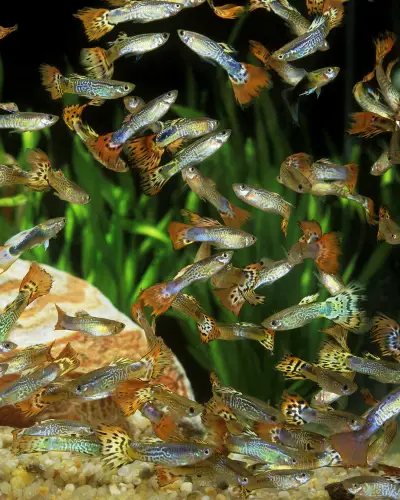
What to feed guppy fish? In captivity, replicating this diet with high-quality fish flakes, live or frozen food like brine shrimp, and occasional vegetable treats can keep them healthy and active.
A proper guppies feeding routine not only enhances their vibrant colors but also ensures a thriving tank ecosystem. Keep reading to learn how to create the perfect meal plan for your guppies!
Keep reading to learn about “what guppy fish eat” and, the proper guppy nutrition for ensuring your pet’s well-being!
Table of Contents
ToggleWhat Do Guppies Eat in the Wild?
What do wild guppies eat? In the wild, guppies are omnivorous scavengers that feed on various items. They consume algae, aquatic plant matter, and water insect larvae such as mosquitoes or other small swimming insects.
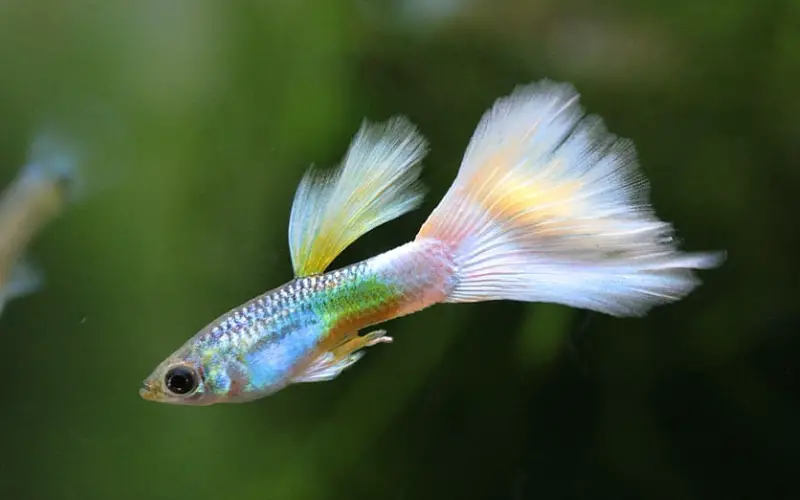
Wild guppies also occasionally eat small crustaceans such as daphnia, copepods, and ostracods. They may also snack on detritus from decaying organic material accumulating in their habitats.
What Do Guppies Eat in a Tank?
What does guppies eat? Guppies will happily feed on a wide variety of items in an aquarium. They particularly enjoy meat-based foods such as blood worms, beef hearts, daphnia, and brine shrimp. They can also be given vegetables like zucchini, spinach, and lettuce.
If you want to give them something more nutritious, you can opt for freeze-dried foods like tubifex worms or krill. A balanced diet that provides all the necessary nutrients for guppies is important. To maintain their health and condition,
Feeding your guppies too much may lead to obesity and other problems, so aim for moderation when offering food!
Remember: Adult brine shrimp are not yet equipped to process food, so be sure to provide them with something else as nourishment.
Best Home Made Food for Guppies: (Guppy Food Homemade)
What to feed guppies in home tanks? Homemade food for guppy fish: Guppies love homemade food dishes. It is possible to give them fresh cut-down vegetables, including lettuce, mustard greens, or zucchini.
what kind of food do guppies eat? You may sometimes give them small bites of fruit, such as bananas or grapes, as a snack—guppies like hardboiled eggs. Please keep the food very small, as guppies have tiny mouths!
You can also make your food mix. You may include ingredients such as cooked quinoa or oatmeal and mix it with some frozen veggies.
5 Creative Guppy Fish Food Homemade Ideas: (what does a guppy eat)
What food can guppies eat? There are lots of creative ways to feed adult guppies. For example, it’s possible to set up a scavenger hunt for them by hiding small pieces of food among the aquarium plants or rocks in your tank.
This will help keep them active and engaged in their environment. You may also hang food on a string above the water to give them a fun challenge.
1. Special Treats: You can make a special treat for your guppies by combining cooked vegetables with mashed bananas, boiled eggs, and fish flakes. This is a nutritious, fun meal that your guppies will love!
2. Guppy Power Balls: If you want to give your guppy something extra special, you can make “guppy power balls” by combining pureed frozen peas and carrots with ground fish flakes. These are nutritious treats that your guppies will enjoy!
3. Guppy Fritters: If you want to give your guppies a tasty treat, try making some guppy fritters! Mix rice, pureed vegetables, and fish flakes to make these delicious patties.
4. Frozen Fish Food: You can create homemade guppies fish food for your guppies by blending up shrimp, krill, daphnia, tubifex worms, and other items with some water in a food processor. This is a great way to treat your guppies and ensure they get plenty of nutrition!
5. Guppy Popsicles: You can make nutritious guppy popsicles by freezing pureed cooked vegetables, mashed bananas, boiled eggs, and fish flakes. These are a fun way to give your guppies something cool and delicious!
As you can see, there are plenty of creative homemade guppy food ideas that you can try out. Just provide a balanced diet with the proper nutrients for your guppies so they stay healthy and active!
Best Fish Food for Guppies:
What food does guppies eat? Guppies often appear hungry and enjoy everything you provide them. Even though it has a small stomach, it usually consumes huge amounts of food whenever it comes. Unfortunately, they are underfed too.
So feeding your hungry fish anything else is no good. Guppies eat an extensive diet and enjoy eating healthy foods. You could serve it with homemade or commercially made fish. The best food for guppies is a balanced diet that contains high proteins, healthy fats, essential vitamins, and minerals.
The diet should include high-quality commercial guppy food flakes and pellets, small live foods such as they eat mosquito larvae and brine shrimp, cooked vegetables and fruits, and occasional treats like blood worms.
You should also avoid overfeeding your guppies as it can lead to health problems such as obesity and digestive issues.
Commercially Available Fish Food Options
what type of food do guppies eat? When considering what fish food to purchase for your aquarium, a variety of commercial food options are available. The most common types of guppies fish food include:
- Fish Flakes – These fish food flakes are mass-produced and designed to be eaten easily by various species. They often come in convenient, single-serving containers or packets, making them easy to distribute in the fish tank.
- Pellets – This commercial fish food is made from ground-up algae and other organic matter, then compressed into pellets. Pellet food options are great for larger fish as they offer more nutrients than flakes and can be swallowed whole rather than broken down first, as flakes do.
- Freeze-dried foods – Freeze-dried foods such as brine shrimp, krill, bloodworms, etc., are highly nutritious treats that provide vitamins and minerals that can’t be found in other forms of commercially available food.
- Live foods – A diet rich in live foods will also supply your fish tank with lots of extra nutrition, which may not be present in dried and processed food alternatives. Live worms (including earthworms), mosquito larvae, or daphnia can all provide beneficial proteins and fatty acids that promote the growth and development of healthy aquarium inhabitants!
Best Pellet Food for Guppies
Pellets provide a great convenience for feeding the guppies. The pellets come in different sizes so that you can match their sizes. A disadvantage of pellet-feeding foods is that the product disintegrates extremely slowly with aquarium water.
They won’t pollute water for aquariums. Once the granule is disintegrated, your guppies either ate it or ate them – but remember the abundant nature of guppies! And you may need to remove the food you’ve put into the tank.
The intestines are very dehydrated and can cause digestive problems in the pup. Nonetheless, there’s no significant issue, as when pellets are thrown in your tank, they absorb water, aiding digestion.
Best Flake Food for Guppies
Flake snacks are convenient and inexpensive to feed your pup. Flake food is so good that your guppies have it of varying sizes. It makes it easy to break the food into small pieces. Guppies can get flake foods on sale.
If you are looking for flake guppies, you must choose reputable companies. Unfortunately, flake meals contain mostly fillers and only very minimal ingredients.
Best Frozen-Dried Foods for Guppies
Guppies can feed commercial canned or cooked foods in addition to flakes or flakes. Guppies are fed fried food that contains bloodworms, tubeworms, Daphnis, brine shrimps, and insect larvae.
Guppies consume these foods naturally, so these products are filled with essential nutrients that guppies need during development. I’ve found some delicious frozen guppies food recipes.
Live Food
Live food contains good nutritional qualities similar to guppy food in nature. A list of living foods for feeding a guppy is on Amazon and available in any local fish shop or online retailer.
There’s a cheap alternative to cooking live food at home. In your case, you could start a brine shrimp hatchery yourself. If your food contains contaminated food, you could introduce diseases to it.
Therefore we should always get real food from reliable sources. People can purchase live food for guppies from Amazon, eBay, or Amazon. You can buy food at any fish shop.
Wet Food
Wet food consists of frozen and live foods. Guppie eats wet food. As with mosquito larvae, the tubifex worm is a wonderful source. Tubeifexworm is considered a fantastic worm conditioner for guppies.
However, do not give live worms, as these can harm your child’s health. This makes frozen food safer for children. Some excellent choices include frozen shrimp and frozen brine shrimps.
Both adult fry and baby shrimp are great sources of protein. Bloodworms contain fat and can’t compete with them. Feeding wet food to fry guppies can dramatically increase their growth.
How to Make Your Own Guppy Food?
If you prefer a more inexpensive way to create your guppy foods, here are some easy and quick tips for preparing your ingredients. Freeze and take out the piece of food before serving it.
Spread a flake mixture over the ovenproof paper, bake until dry, and crumble it into a container. Here are some ingredients: oats, wheat bran, flaxseed meal, and dried kelp.
What human food can guppies eat? Have you been considering feeding human food to your guppy’s diet with human food? If so, it is important to understand the potential impacts of such a choice.
How Often Do Guppies Eat?
How often do guppies need to eat? Guppies typically eat once or two times a day. They do best when given small, frequent meals throughout the day. Providing them with high-quality protein-rich food is ideal, as guppies depend heavily on proteins for their growth and development.
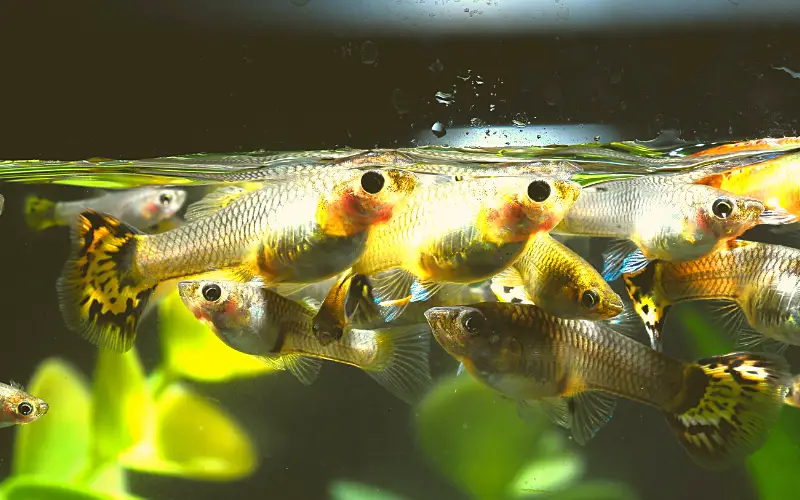
Varied flakes, frozen foods, and a live prey diet should be offered daily to ensure optimal health and nutrition for your guppies. Additionally, removing any uneaten food after 15 minutes is important to prevent water pollution from decaying food particles!
How Long Can Guppies Go Without Food?
Guppies are dependable, tough animals. They can last at least two weeks without food. Even if there’s no definitive answer to a guppie’s lifespan without food, it’s often difficult.
As a travel plan, keeping fish and shrimp treats in the aquarium is essential for survival. Guppies need to get enough good food for guppies. Lastly, keeping the water clean and maintaining a healthy diet for your guppie is important.
What Are the Benefits of Feeding Guppies Properly?
Providing a proper diet for guppies is essential for their health and development. A healthy diet results in healthier, stronger fish with more vibrant colors and increased fertility, making guppies attractive to aquarists.
The most important benefits of feeding your guppies include the following:
1. Increased longevity: Guppies that are adequately fed are likely to live up to 4 years, whereas those who receive inadequate food may only live 1-2 years.
2. Reduced risk of disease: An insufficient or poor quality diet can lead to diseases like Ich or fin rot due to nutritional deficiencies or weakened immune systems. Whereas a balanced and nutrient-rich diet helps strengthen the immune system against such illnesses, improving the overall health of your fish over time.
3. Color Enhancement: Well-fed guppies tend to have richer colors than underfed ones due to improved pigment production caused by adequate nutrition intake, making them more aesthetically pleasing pets, which could add value if you ever decide to sell them!
4 Improved Reproductive Ability: Proper nutrition means better conditions in which male guppies can reproduce successfully, thereby increasing chances of successful breeding cycles leading to further generations and an increase in monetary value if you’re looking at it from an investment perspective.
Feeding your fish is not only beneficial for their overall well-being. Still, it provides them with all the necessary nutrients for proper growth, health, and stability within an aquarium environment, making them beautiful and much-loved little friends enjoying better lives too!
How Much Food Should I Feed My Guppies?
Usually, your pet is fed once a week. You must feed adult guppies twice daily for about 10-15 hours. Give each guppy enough food in a minute. Get more details on what food your guinea pig will be fed and how much.
Overfeeding can be fatal to your guppies!
Is eating too many food guppies harmful? It can cause serious health problems in guppies. The diet should include a wide variety of foods such as high-quality flake foods, frozen or live shrimp, blood worms, and other types of live food.
If a guppy is fed too much, the excess food can rot and create ammonia in the water. This can cause a spike in the pH level and be toxic to guppies. Too much food left uneaten in the tank will also dirty up the water and cause a decrease in oxygen levels.
Overfeeding can cause deadly ammonia build-up in your tank.
If you put food in your guinea pigs’ tanks, they will eat everything because their food is voracious. Adult guppies can get rid of a lot of food by eating lots of food. In your aquarium, these fish wastes can decay and generate deadly ammonia.
A lack of water can decompose into toxic ammonium in our tanks. This ammonia could quickly cause your fish tank bacteria problems. Because ammonia poisons fish, it can kill their lives.
How to Feed Guppies Cucumber?
Do guppies eat cucumber? Proper nutrition is critical for the long-term health and happiness of your guppy.
Unfortunately, guppies are notoriously picky eaters and, when offered the wrong types of food, can suffer from malnutrition and become sick or might be your fish dying prematurely.
Having a hard time figuring out what to feed your guppies? Check out this video tutorial that shows you step-by-step instructions on how to prepare cucumber for guppies, one of the healthiest options available! Our method is easy to follow and will take up to a few minutes to learn.
Can Guppies Eat Other Fish’s Food?
Yes, guppies can eat other fish’s food. They are omnivorous, meaning they can eat both plant and animal matter.
While most of their diet comprises live or frozen foods like bloodworms, brine shrimp, and daphnia, they will also readily accept flake food designed for other fish species like tetras or barbs.
If a guppy can feed on the leftovers from another fish’s meal, such as algae wafers or pellets (if they are small enough), they will happily do so!
What Do Guppy Fry Eat: Best Food for Guppy Fry
What fish food do guppies eat? This can be assumed as a particular frying food. Dry foods, pellets or brittle materials, or powders can sort it. Baby guppies accept almost anything used to feed adults.
Guppy fry food homemade: Fry food is intended to have smaller sizes to ease fish feeding. This includes flake food, baby brine shrimp, and frozen worms. This product is great for guppy fry because of its extremely healthy contents.
Increasing levels of protein are important to fast-growing plants. Show all commercial food products designed for fryers.
Can Guppy Fry Eat Egg Yolk?
Can guppies eat egg yolk? Egg yolks are commonly given for Guppy fry but are also fed to adults. Just boil the eggs first and then add the yolks. Egg yolk contains high protein and vitamin C, which encourage the rapid growth of the baby guppies.
Additionally, egg yolks are highly palatable and can be easily accepted by guppy fry. However, it would help if you were sure not to overfeed your fry, as it can cause stress and even lead to death.
Most experts suggest giving fry egg yolk in moderate amounts once or twice a week. When providing egg yolks, make sure the fry is not over-fed.
How Frequently Should Baby Guppies Eat?
For the guppy fry, you must eat it more frequently as their development has yet to begin. The child should eat between 5 a.m. and 8 p.m. As their cells change rapidly, proteins are the major component of their diet. It is because they are tiny that they can eat very little.
It makes sense to feed your children regularly. Give them little food to eat. Most guppy foods are unused and float as dirt in the aquarium. Underfeeding has a negative effect even in adulthood.
Commonly Asked Questions about What Food Do Guppies Eat (FAQs)
Do Guppies Eat Flakes?
Do guppies eat tropical flakes? Yes, guppies will readily eat flakes. They are omnivorous and will consume both plant and animal matter. Flake food designed for other fish species, such as tetras or barbs, can also be given to guppies.
Can Guppies Eat Goldfish Food?
Yes, guppies can eat goldfish food. Both species consume the same base ingredients: proteins, carbohydrates, fats, and minerals. Goldfish food usually contains things like freeze-dried brine shrimp, peas, and spinach, all providing essential nutrients for guppies.
Can Guppies Eat Bloodworms?
Do guppies eat bloodworms? Yes, guppies can eat bloodworms. These bloodworms are a good source of protein and essential minerals and can also benefit from their nutritional value. Bloodworms are also completely safe for your guppies since they are free of parasites or disease-causing organisms.
Can Guppies Eat Tropical Flakes?
Yes, adult guppies can eat tropical fish flakes. Flake fish foods are a great source of nutrition for guppies, and they will typically consume any flake food you offer them.
Can Guppies Eat Betta Food?
Yes, guppies can eat betta food. Betta food is usually a combination of meaty and plant-based ingredients that provide essential nutrients for guppies. Betta food is fortified with vitamins and minerals to keep your guppies healthy.
Can Guppies Eat Shrimp?
Yes, guppies can eat shrimp! They make an excellent nutritional addition to their diets. Shrimp can be fed to your guppies raw, and the small pieces of meat provide them with a much-needed protein boost. Additionally, shrimp are great sources of omega fatty acids, ensuring your fish have all the nutrients they need for healthy growth and development.
Do Guppies Eat Algae?
Yes, guppies eat algae! They consume various algae from their natural diets, such as filamentous and diatoms. They can also help control algae levels in an aquarium by eating excess or overgrowing growths.
Can Guppies Eat Bread?
Feeding your guppies bread is generally not recommended, as it does not provide any nutritional value or substitute for the food they need. Guppies can eat bread. However, it should only be given in small amounts and as an occasional treat or snack.
How to Prepare Vegetables to Feed Your Guppies?
How to feed guppies vegetables? You must prepare vegetables before feeding guppies with them; they will eat them as soon as possible. Give your pet fish a tasty snack by prepping their vegetables with dechlorinated water. For optimal freshness and nutrition, remove any leftovers after four to five hours of feeding – blanching the veggies beforehand helps make mealtime easier for them!
Are guppies herbivores?
No, guppies are omnivores. They enjoy a mix of plant-based foods like algae and flakes, as well as small insects and insect larvae.
Are guppies omnivores?
Yes, guppies are omnivores! They enjoy a mix of plant-based matter like algae and flakes, along with small insects and insect larvae.
Do guppies eat cucumber?
Can guppies eat cucumber? Guppies can nibble on cucumber, but it’s not their main food. Offer it occasionally as a treat, but stick to a high-quality guppy diet for complete nutrition.
Do guppies eat copepods?
Yes, guppies are omnivores and will readily eat copepods, a natural food for guppy fish rich in nutrients.
What vegetables can guppies eat?
What vegetables do guppies eat? Guppies enjoy various veggies as a treat! Blanched spinach, zucchini, cucumber, and peas are all safe options. Just chop them tiny!
Do guppies eat daphnia?
Yes, guppies are omnivores and will happily eat daphnia, a nutritious live food source. It’s a great occasional treat for vibrant colors and growth.
Can guppies eat vegetables?
Do guppies eat vegetables? Yes, guppies are omnivores and enjoy occasional veggies! Offer blanched zucchini, spinach, or peas as a treat, but high-quality fish food remains their main diet.
What do guppies like to eat?
What do guppys eat? Guppies are omnivores! They enjoy a varied diet of high-quality flake food, occasional treats like brine shrimp, and even blanched veggies like spinach.
What do baby guppies eat?
What can guppies eat? Baby guppies thrive on tiny foods! Infusoria, finely crushed flakes, or baby brine shrimp are all great options for their small mouths.
Can guppies eat broccoli?
Guppies can nibble on blanched broccoli, but it’s not ideal. Stick to high-quality fish food and occasional veggies like zucchini or cucumber.
Can guppies eat strawberries?
Guppies shouldn’t eat strawberries. It lacks nutrients they need and can pollute the water. Stick to high-quality fish food for a healthy diet.
Can guppies eat rice?
No, guppies shouldn’t eat rice. They are omnivores but rice lacks nutrients they need. Stick to flake food, brine shrimp, and veggies for healthy guppies.
How many pellets to feed guppies?
Adult guppies need 2-3 small pellets, 2-3 times a day. Observe their bellies – they should be slightly rounded after guppies feeding, not bulging. Leftover food means you’re overfeeding.
Can guppies eat lettuce?
Yes, guppies can nibble on lettuce as a supplement to their main diet. But blanch it first, cut it small, and remove any pesticides! Offer it sparingly as a treat.
What food is best for guppies?
What to feed a guppy? For guppies, a high-quality flake or pellet food is ideal, with live or frozen brine shrimp, daphnia, or bloodworms as a supplement.
What does guppy eat in the wild?
In the wild, guppies are omnivores that feast on algae, tiny insects, and even debris for a balanced diet.
Can guppies eat betta pellets?
Yes, guppies can eat betta pellets occasionally. However, the pellets might be too big for smaller guppies. Offer a crushed pellet or a mix of betta food with their usual flakes or brine shrimp for a balanced diet.
What to feed guppies when out of food?
If you run out of guppy food, you can feed them boiled vegetables like peas or zucchini, or small pieces of cooked fish or shrimp as a temporary alternative.
Do guppies like bloodworms?
Yes, guppies generally enjoy bloodworms as a tasty and nutritious treat. It’s important not to overfeed them with bloodworms, as they should be part of a varied diet for guppies.
Do guppies eat brine shrimp?
Yes, guppies can eat brine shrimp, and they often find them to be a tasty and nutritious treat. Brine shrimp can be a good addition to their diet in moderation.
Conclusion
So, what does guppy fish eat? Caring for a guppy is relatively straightforward, especially when you know what to feed guppies in home tank. Knowing the diet of your guppy fish is essential to keep your fish healthy and happy. By feeding them a varied diet with the right components, their overall health will be improved, and their life expectancy will increase. A balanced diet provides a variety of nutrients they need to thrive. Finding the right food sources to provide nutrition and variety is the key to maintaining the best diet for guppies.
Remember, when it comes down to it, fresh wet food is always better than frozen or commercially-prepared products, so keep this in mind when looking for good food for guppies. Lastly, ensure that whatever you’re giving matches their size, as smaller guppies may need help handling larger food items. This comprehensive guide lets you know exactly what does guppy eat and how to feed them the best possible diet! Feeding your guppy an optimal meal plan will help ensure long-term health and vitality so they can live the longest and happiest life they deserve! keep reading the entire article to learn more about what do guppy eat?
You might also like
- How Often Should You Feed Guppies: 9 Tips to Keep Guppy Healthy
- Do Guppies Need Heaters: A Comprehensive Beginner’s Guide
- How Long Does Guppy Live: 7 Easy Tips to Prolong Their Life
- Will Different Guppy Fish Types School Together? (Solved)
- How Many Guppies in a 10 Gallon Tank: (An Exclusive Guide)


